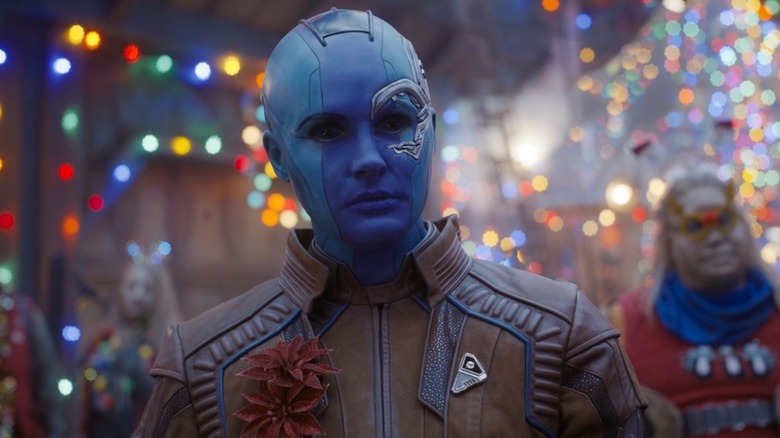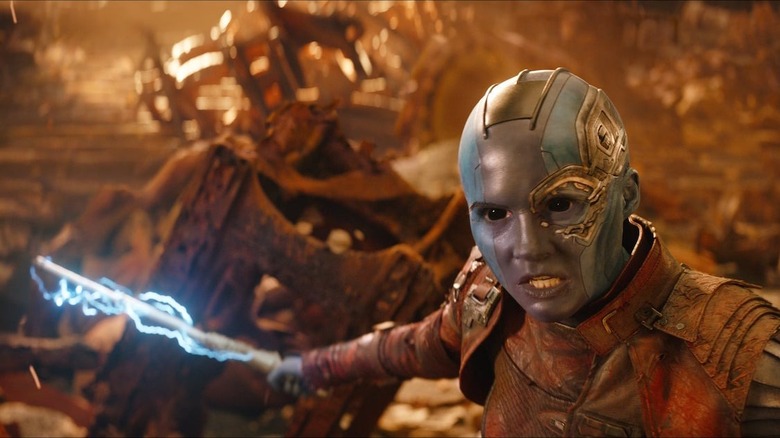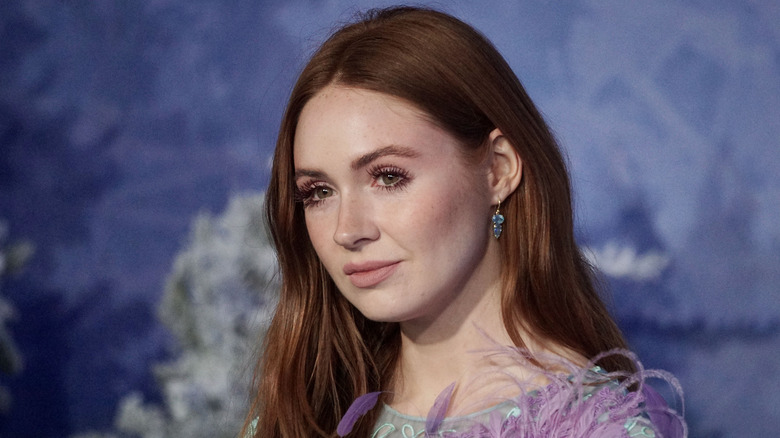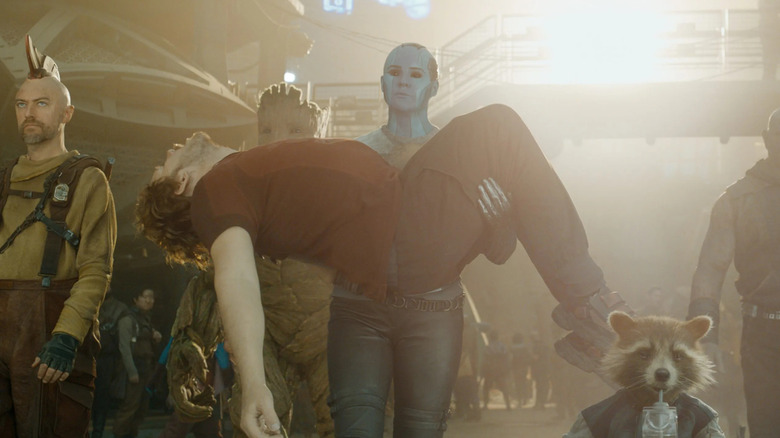Guardians Of The Galaxy Vol. 3 Makes It Clear: Nebula Is The Best MCU Character
This post contains spoilers for "Guardians of the Galaxy Vol. 3."
"Guardians of the Galaxy Vol. 3" is a farewell to the titular team. There's one character I'm particularly sad about saying goodbye to: Nebula (Karen Gillan), the grumpy alien cyborg anti-hero who wormed her way into my heart. At the beginning of this trilogy, I never would've guessed she'd end it as my favorite character of the ensemble. She's a pretty standard villain in the first "Guardians of the Galaxy" and couldn't stand out next to Lee Pace's enormous performance as Ronan the Accuser.
"Guardians of the Galaxy Vol. 2" redeemed Nebula in more ways than one. She not only turned from antagonist to teammate — giving her more opportunities to bounce off the other characters — the seeds of a deeper characterization from the film blossomed and she became a downright compelling character. Looking back at both the "Guardians" trilogy and the "Infinity Saga" as whole narratives, I'd say Nebula is one of the most cohesive characters across both.
A consistent character arc
For its vaunted "shared universe" storytelling, the films of the Marvel Cinematic Universe often don't build on previous ones except in superficial ways.
In "Iron Man 3," Tony Stark (Robert Downey Jr.) overcomes his PTSD and compulsive need to innovate and save the world. Then in "Avengers: Age of Ultron," it's like none of that ever happened. "Avengers: Infinity War" undoes every development "Thor: Ragnarok" made to the God of Thunder, down to him getting a cybernetic eye and replacement hammer. I won't even attempt to track the mess that is the Hulk's journey as a character.
Nebula, though, has an arc that flows from movie to movie. Her journey is about three things: escaping Thanos' thumb, reconciling with Gamora, and becoming a better person. Each new film is a step forward and there's never any backtracking for narrative's sake.
James Gunn didn't always agree with how the two-part "Avengers: Infinity War" and "Endgame" wrote the Guardians. However, Nebula's character even survives out of his hands. In the latter, she comes face-to-face with alternate versions of herself and Gamora, ones who are still enslaved by Thanos. This alternate Nebula represents the darker side of the character, the one that was up front when we first met her. When the alternate Nebula rejects redemption, "our" Nebula kills the variant, symbolically overcoming her past demons. Nebula also convinces the alternate Gamora to turn on Thanos, saving her sister's soul like Gamora once did for her.
Nothing without a performance
I can't compliment Nebula without spotlighting Karen Gillan. She's downright unrecognizable as Nebula thanks to the extensive blue-skin make-up. Nebula's shaved head and breathy, robotic voice also means Gillan's trademark red hair and Scottish accent are gone. However, it's Gillan's talents that make Nebula the character she is.
Gunn's films are heavy on comedy, but the first "Guardians" film mostly kept Nebula out of that — barring one moment. After Thanos (Josh Brolin) is done threatening Ronan should he fail, Nebula struts away with the sardonic, "Thanks, Dad — sounds fair." From there, she has some of the best line reads in "Guardians of the Galaxy Vol. 2," thanks to her exasperation blending poorly with the other characters' eccentricities.
When the team is being chased by the Sovereign, the captive Nebula screams "IDIOTS!" During the first act, Nebula keeps trying to eat a piece of fruit, but the others tell her not to — the fruit isn't ripe. When Nebula breaks free, she finally tries the fruit and then spits it out in disgust. Humbled, she finally concedes, "It's not ripe."
Nebula is a funny character because she can be both straight-woman and comic, depending on the scene. Gillan's strengths aren't all comedy, though. Nebula's anger hides anguish, and you can feel that in her haunted tone whenever she's describing her childhood of torture or her rage towards Thanos. Her delivery that stands out the most to me is in "Vol. 2," when she finally, angrily opens up to Gamora: "You wanted to win, I just wanted a sister!" With that line, Nebula becomes so much more than what we, and Gamora, thought she was.
Full circle in Vol. 3
In "Vol. 3," Nebula is 100% a good guy but her transformation still isn't over. She's still cold and short-fused — that's why most of her screen time is shared with Drax (Dave Bautista) and Mantis (Pom Klementieff), the two loudest and least intelligent Guardians. After chewing the two out one too many times, Mantis fires back and points out Nebula's problems like only an empath can: she still hasn't achieved self-acceptance and that's why she's always so angry with everyone else.
Nebula's last adventure with her new family is about her learning to appreciate them even for their flaws. She moves heaven and earth to save Rocket — who she once disparaged as a "stupid fox" — she calls Quill "Peter" instead of "Star-Lord," and she comes to appreciate Drax's good intentions and skill with kids. That's why Nebula and Drax are the only two Guardians who stay on Knowhere. They're going to help raise the children the Guardians rescued from The High Evolutionary (Chukwudi Iwuji).
By saving these kids from gruesome experimentation and giving them a loving home, Nebula's character comes full circle — she's doing for others what she wished someone else had done for her. The last time we see Nebula, she's dancing along with everyone else and even smiles. Not just a slight smirk either, but a joyous, open mouth laugh. Gillan has called Nebula's arc "a journey of healing." Nebula's skin might be artificial, but by the end of "Vol. 3," she's finally comfortable enough in it to love herself and others.
"Guardians of the Galaxy Vol. 3" is playing in theaters.



